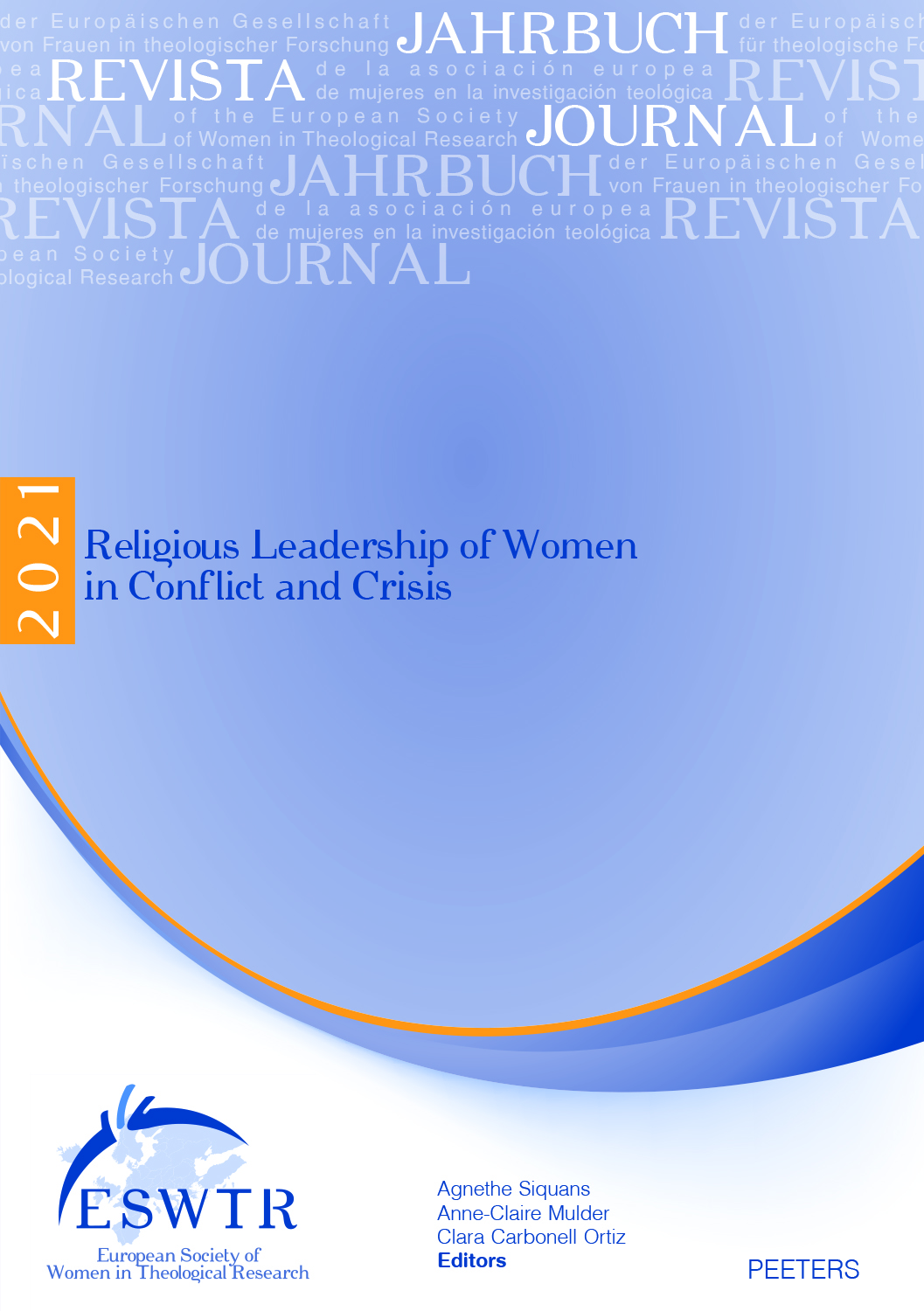 previous article in this issue previous article in this issue | next article in this issue  |

Preview first page |
Document Details : Title: Gendered Mysticism as a Disruptive Performance of the Incarnation Author(s): GROVIJAHN, Jane M. Journal: Journal of the European Society of Women in Theological Research Volume: 23 Date: 2015 Pages: 21-38 DOI: 10.2143/ESWTR.23.0.3103629 Abstract : Medieval women’s mysticism offers us thick and varied languages of female embodiment illuminating their encounters with the Divine. Is it possible to leverage this tradition of female ecstasy against the common reality of violence against women? In particular, how does a mystical affirmation of the female body speak to a contemporary reality of gender-based violence known as 'feminicide'? Feminist reparative readings (Eve Kosofsky Sedgwick) of the mystical tradition point to new receptions of Incarnation, bridging the actual way many women today experience their embodiment of harm to a transgressive Presence of the Divine. Influenced by the writings of Dorothee Soelle and Beverly Lanzetta, the author poses a feminist performative reading of Incarnation within the mystical tradition that opens into a 'militant mysticism' tentatively capable of speaking to the all-too-common catastrophe of gendered violence. Within these places of diminishment, new windows of divine agency shine with unexpected grace and efficacy subverting the dominant narrative of female subordination. Although embedded in conflicted agency and embodiment, women’s medieval mystical writing offers practices of Incarnation that wed resistance and resiliency, disclosing radical expressions of an excess of the Divine precisely in places of bodily diminishment. Die Mystik mittelalterlicher Frauen bietet uns eine dichte, vielfältige Sprache weiblicher Körperlichkeit, die ihre Begegnungen mit dem Göttlichen erhellt. Ist es möglich, diese Tradition weiblicher Ekstase gegen die allgemeine Wirklichkeit von Gewalt gegen Frauen wirksam einzusetzen? Und vor allem, was hat die mystische Bejahung des weiblichen Körpers zu der heutigen Wirklichkeit von geschlechtsspezifischer Gewalt, bekannt als 'Feminizid', zu sagen? Feministische reparative Lesarten (Eve Kosofsky Sedgwick) der mystischen Tradition verweisen auf neue Rezeptionen der Inkarnation und überbrücken die konkreten Formen, in denen viele Frauen heute ihre Körperlichkeit als Leid erfahren, auf eine transgressive Gegenwart des Göttlichen hin. Beeinflusst von Dorothee Sölle und Beverly Lanzetta situiert die Autorin eine feministische, performative Lesart der Inkarnation in der mystischen Tradition, die sich auf eine 'militante Mystik' hin öffnet, die potentiell fähig ist, die nur zu sehr verbreitete Katastrophe geschlechtsspezifischer Gewalt zu addressieren. An diesen Orten von Leid leuchten neue Fenster göttlicher Handlungskraft mit unerwarteter Gnade und Wirksamkeit, die die herrschenden Narrative weiblicher Unterordnung unterwandern. Obwohl in konflikthafte Handlungskraft und Körperlichkeit eingebettet, bieten die mystischen Schriften mittelalterlicher Frauen Praktiken der Inkarnation an, die Widerstand und Elastizität miteinander verbinden und radikal einen Exzess des Göttlichen gerade an Orten körperlichen Leids ausdrücken. La mística de las mujeres medievales nos ofrece lenguajes intensos y variados de 'corporalización' (embodiment) femenina que iluminan su encuentro con lo Divino. ¿Es posible aprovechar esta tradición de éxtasis femenina en oposición a la realidad habitual de violencia contra las mujeres? En particular, ¿en qué modo una afirmación mística del cuerpo femenino habla a la realidad contemporánea de violencia de género llamada 'feminicidio'? Las lecturas feministas de reconstrucción de la tradición mística (Eve Kosofsky Sedgwick) apuntan a nuevas formas de recepción de la Encarnación, haciendo un puente entre la forma real en que muchas mujeres hoy en día experimentan la 'corporalización' del mal sufrido y una Presencia transgresora de lo Divino. Influenciada por los escritos de Dorothee Soelle y Beverly Lanzetta, la autora plantea una lectura feminista performativa de la Encarnación dentro de la tradición mística, que se abre a una 'mística militante' provisionalmente capaz de hablar a la tragedia demasiado común de la violencia de género. Dentro de estos espacios de debilitamiento, nuevas lecturas de la agency divina aportan una gracia y una eficacia inesperadas e iluminadoras subvirtiendo el discurso dominante de la subordinación femenina. Aunque incrustada en una agency y una 'corporalización' en conflicto, la escritura mística medieval de las mujeres ofrece prácticas de Encarnación que enlazaron resistencia y resiliencia, revelando expresiones radicales de un exceso de lo Divino precisamente en espacios de debilitamiento físico. |
 |


